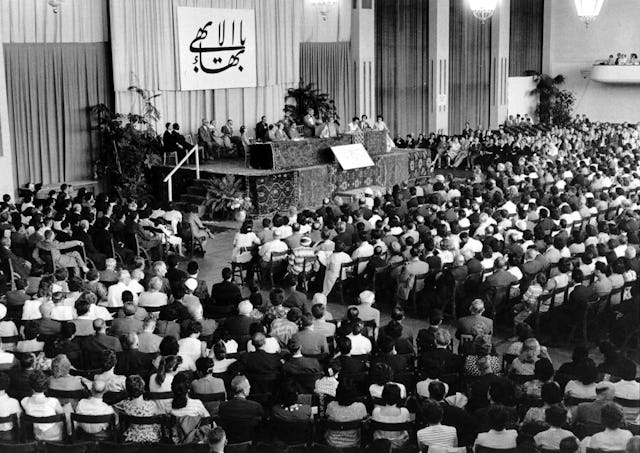Senior government minister praises Baha'i contributions
BERLIN, Germany — The German Minister for Home Affairs, Otto Schily, has praised the contributions of German Baha'is to the social stability of the country.
In a congratulatory message to the German Baha'i community at a reception held on 10 May 2005 to celebrate its centenary, Mr. Schily said that German Baha'is actively support the protection and preservation of common values as well as the equality of all human beings.
"It is not enough to make a declaration of belief," Mr. Schily said. "It is important to live according to the basic values of our constitutional state, to defend them and make them secure in the face of all opposition. The members of the Baha'i Faith do this because of their faith and the way they see themselves."
Mr. Schily said that Baha'u'llah's "extremely humane" principle guiding people to dedicate themselves to the service of the entire human race was valid for all the great religions of the world as well as for every country concerned with human beings and their rights.
He said that, in view of the inflammatory slogans by some extremist groups, the message to the religious leaders of the world issued by the Universal House of Justice in 2002 was of great importance in the world. (For more about that message see https://news.bahai.org/story.cfm?storyid=159)
Together, Mr. Schily said, Germans must abolish racial and ethnic prejudices and fight the nationalism that incites hatred of others rather than enriches the love of one's country.
"I wish the Baha'i community in Germany a peaceful and dignified future for their members but also, true to their own guiding principle, for all humankind," he said.
The centenary reception was held at the Berlin headquarters of the government of Hesse, the state in which the Baha'i House of Worship and national center is located.
The program included a panel discussion on the "Requirements of Social Cohesion" that focused on social orientation and the role of religion in today's society.
In a keynote address introducing the discussion, a prominent member of the German federal parliament, Ernst Ulrich von Weizsaecker, commended the ideas of the German Baha'i community on social integration, which they published in a statement in 1998.
Other participants in the panel discussion included: the state secretary in the Federal Ministry of Family Affairs, Senior Citizens, Women, and Youth, Marieluise Beck; the president of the Federal Agency of Civic Education, Thomas Krueger; the plenipotentiary of the Council of the Protestant Church of Germany to the Federal Republic and the European Union, Stephan Reimers; and the academic director of the Townshend International School in the Czech Republic Friedo Zoelzer.
Among the invited guests were Hindus, Buddhists, Jews, Christians, and Muslims.
The gathering in Berlin was the second centenary event held by the German Baha'i community. A third will be held in September 2005.
On 22 April 2005 a reception was held at the national Baha'i center in Hofheim-Langenhain adjacent to the Baha'i House of Worship for Europe, which opened in 1964.
Guests included representatives of the Federal and European Parliaments, the government of the state of Hesse, the cities of Hofheim and Wiesbaden, and political parties.
At that reception, the state secretary of the Ministry of Science and Art of Hesse, Joachim-Felix Leonhard, praised the principles of the Baha'i Faith, describing the Baha'i message as "cosmopolitan, global, and modern."
"The Baha'is," Professor Leonhard said, "are seeking to communicate and understand at a time when others are talking about a clash of civilizations."
The mayor of Hofheim, Gisela Stang, referred to initial opposition to the establishment of the Baha'i House of Worship in Hofheim-Lanenhain 41 years ago but said the Baha'is are now fully integrated into the community.
"They provide an important impulse for the city and for society," said Ms. Stang, referring to the forums the Baha'is organize and to their cultural diversity.
"It would be good if these activities could be expanded upon -- the city of Hofheim would provide support."
Representing the city of Wiesbaden, Angelika Thiels thanked the Baha'i community for its contribution towards nurturing understanding among religions. Ms. Thiels also referred to the contribution of the Baha'i community in offering to the wider society regular children's classes in which pupils learn about spiritual and moral values.
The chairperson of the National Spiritual Assembly of the Baha'is of Germany, Saba Khabirpour, spoke about the history and the development of the Baha'i community, and the relationship between the spiritual development of individuals and the advancement of mankind in the material world.
Also present at the gathering were the architect of the Baha'i House of Worship in Germany Teuto Rocholl, a former member of the Continental Board of Counsellors in Europe Anneliese Bopp, and former and present members of the National Spiritual Assembly.
An article about the centenary of the Baha'i community of Germany appeared in a major newspaper, "Frankfurter Allgemeine Zeitung," on 20 April 2005.
The final centenary event of the German Baha'i community will be held in September in Stuttgart.
It was in that city where the first member of the German Baha'i community, a German-born dentist from the United States, Edwin Fischer, settled in 1905.
'Abdu'l-Baha, the son of Baha'u'llah and the head of the Faith from 1892-1921, visited there in 1913. The first National Spiritual Assembly of the Baha'is of Germany was formed in 1923.
From 1937-1945 Baha'i activities were banned in Nazi Germany, in part because of the Faith's progressive teachings including on the oneness of humanity. Local Baha'i communities were dissolved and their literature was confiscated. Some of the believers were interrogated, imprisoned, and deported by the authorities. Some Baha'is of Jewish background were killed by the regime.
After World War II the German Baha'i community soon reestablished its activities. By 1950, there were Baha'is living in 65 localities in Germany. However, the Baha'i community in Eastern Germany was dissolved until the fall of the Berlin Wall in 1989.
Today German Baha'is live in 900 towns and cities throughout the country. There are 106 Local Spiritual Assemblies. The Baha'i community is active in the discourse on interfaith and gender equality issues, as well as in sustainable development and human rights education.
Baha'is also hold regular study circles and prayer gatherings, which are open for participation to the wider public.
For more information about the Baha'i community of Germany, see http://www.bahai.de
For more information about centenary celebrations of the Baha'i community of Germany, see http://news.bahai.de

